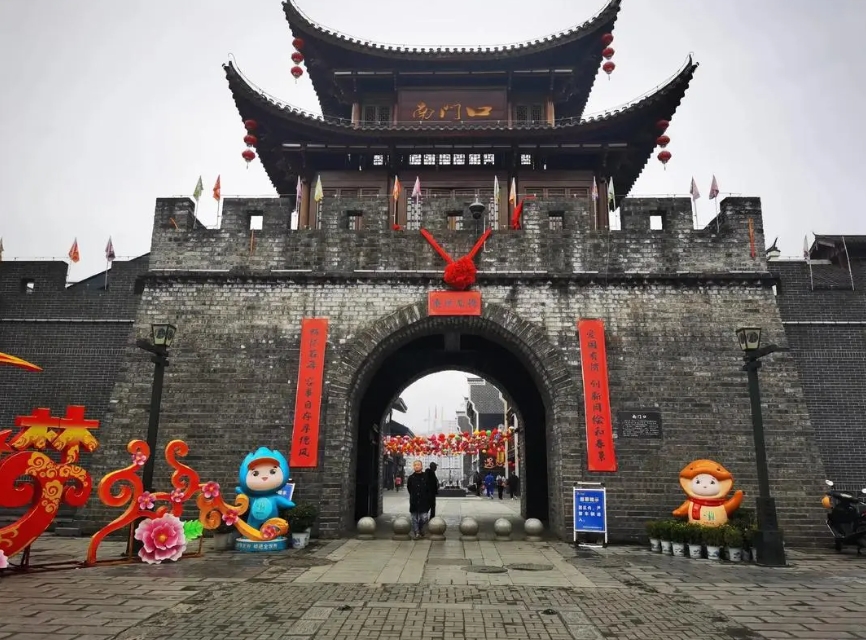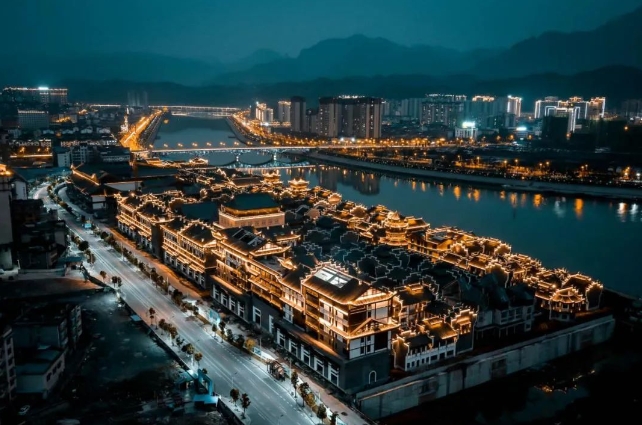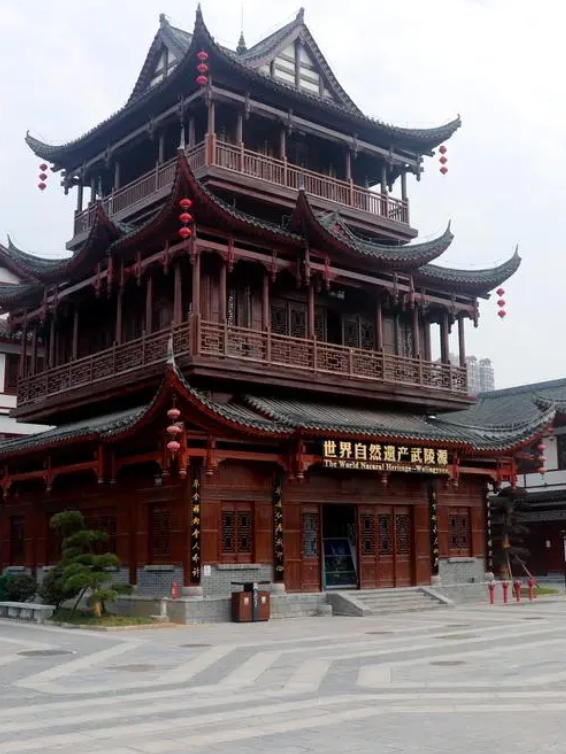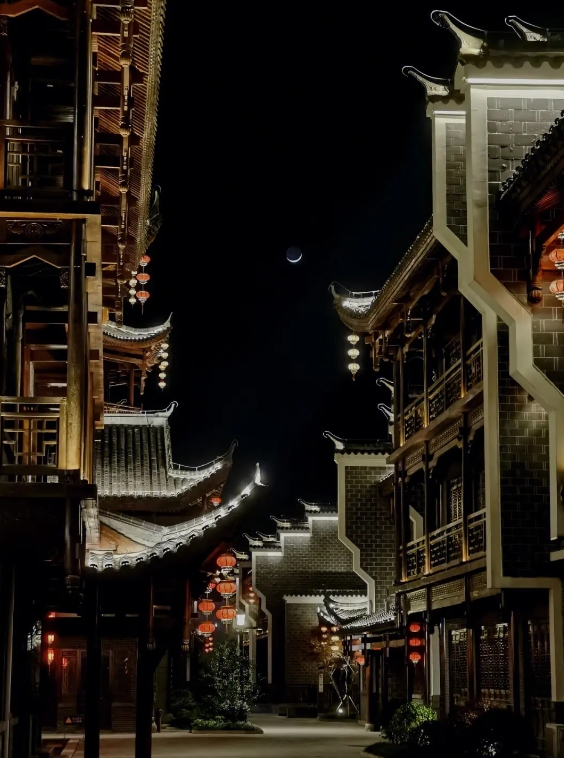On the land of China, sculpted by time, there is a city that lies by the mountains and rivers, shrouded in clouds and mist, as if it were a brilliant pearl inadvertently left behind by nature. This city is called Zhangjiajie, a place imbued with an ethereal quality in its name, attracting countless travelers with its unique stone pillar landscape, fresh air, and simple folk customs. However, in a corner of this city, there is a story that quietly tells of the bitterness and reflection brought about by overdevelopment, like a fallen leaf in autumn.

The Dream of the Ancient City: Beginning in Prosperity, Ending in Silence
The protagonist of the story is an ancient city named Dayong. It was supposed to be another highlight of deep cultural tourism in Zhangjiajie, carrying the mission of inheriting history and promoting culture. The construction of Dayong Ancient City was like a grand stage play, with the curtain slowly rising, lights dazzling, and people filled with anticipation, believing they would witness a perfect blend of history and modernity. However, reality struck like a sudden storm, causing the performance to end prematurely, leaving only an empty stage and mottled memories.
The original intention of building Dayong Ancient City was good; it aimed to provide a sanctuary for tourists to touch history and feel culture amidst the tide of modernization. However, during the implementation process, it resembled a painter eager to prove themselves, whose brush strokes were too hasty and colors too intense, resulting in a loss of the original harmony and beauty of the picture. Excessive commercialization, homogenized attractions, and soulless cultural replication have turned this ancient city, which should be full of stories, into something hollow and dull.

The Double-Edged Sword of Overdevelopment: Wounding the Hearts of Tourists
Overdevelopment is like a double-edged sword; on one hand, it brings short-term economic benefits, while on the other, it invisibly wounds the hearts of tourists, causing their reverence and longing for nature to fade away.
The Flood of Commercialization Drowns the Soul of Culture
In Dayong Ancient City, you can see all kinds of shops, from specialty snacks to handicrafts, everything is available. However, behind these shops, there is a lack of true cultural depth and uniqueness. They resemble products on an assembly line, mass-produced, losing the warmth and soul they should have. Tourists here cannot find the tranquility of conversing with history, nor hear the whispers of ancient stories, only the clamor of shouting and cold transactions.
Homogenized Attractions Lead to Aesthetic Fatigue
Entering Dayong Ancient City, you will find that both the architectural style and the attractions bear an astonishing resemblance to other ancient cities. Those meticulously carved stone bridges and quaint pavilions, while exquisite, evoke an indescribable sense of aesthetic fatigue. Tourists here cannot find the surprise of “a hidden village after the willows,” only the blandness of “the swallows returning to a familiar place.”
Environmental Destruction Makes the Beauty of Nature Fade Away
Overdevelopment not only destroys the original ecological environment of the ancient city but also affects the harmony of the surrounding natural landscape. To attract tourists, some places spare no effort in sacrificing the environment to build large amusement facilities and expand tourism projects. However, these actions are like a sharp axe, striking at the body of nature, turning once-clear streams murky and filling once-quiet valleys with the roar of machines. Tourists here cannot feel the tranquility and beauty of coexisting harmoniously with nature, only worries and helplessness about the environment.

The Departure of Tourists: A Silent Protest
The departure of tourists is not an overnight occurrence. It is like a long farewell, from initial disappointment to later indifference, and finally to forgetfulness.
The Seeds of Disappointment Take Root Silently in the Heart
For many tourists, Dayong Ancient City should have been a sanctuary in their hearts, a place to lay down their fatigue and seek solace. However, when they step onto this land, they find a huge gap between reality and imagination. Those overly packaged attractions, the atmosphere of commercialization, and the homogenized experiences leave them feeling disappointed and dissatisfied. This disappointment is like a seed, silently taking root in their hearts and gradually sprouting.
The Indifferent Turn is a Silent Protest Against Overdevelopment
After disappointment comes indifference. When tourists realize they cannot find the beauty they had anticipated in this ancient city, they begin to choose to turn away. This turn is not a momentary impulse but a silent protest against overdevelopment and rampant commercialization. They express their desire and pursuit of the beauty of nature and the charm of culture through their actions.
The Forgotten Corners are Scars of Time
As time passes, Dayong Ancient City gradually becomes a corner of people's memories. Those who once held expectations and yearnings for it begin to forget it. This forgetfulness is not a complete erasure but a deep burial in the heart, becoming a past that is unwilling to be mentioned. Those who once left footprints and laughter here have also become passersby of time, taking away their memories and feelings for this ancient city.

Reflection and Enlightenment: Returning to Nature, Seeking the True Soul of Tourism
The investment failure of Dayong Ancient City is not only a heavy blow to Zhangjiajie's tourism industry but also a profound warning to the national tourism industry. It tells us that excessive development and rampant commercialization will only drive tourists away, while the true soul of tourism lies in returning to nature, respecting culture, and focusing on the inner needs of people.
Returning to Nature Makes Tourism a Spiritual Baptism
True tourism should not just be a superficial visit, a fleeting glance. It should be a spiritual baptism, a journey of intimate contact with nature. We should protect the natural environment as we protect our eyes, allowing tourists to feel the wonders and beauty of nature during their travels. Only in this way can tourists find that long-lost tranquility and beauty on their journeys.
Respecting Culture Makes Tourism a Cultural Feast
Culture is the soul of tourism. We should deeply explore and inherit local cultural characteristics, allowing tourists to appreciate the cultural charm of different regions and ethnicities during their travels. By holding cultural festivals and conducting cultural exchange projects, we can let tourists experience the charm and depth of culture through their experiences.
Focusing on Inner Needs Makes Tourism a Journey of Spiritual Growth
Tourism is not just about physical movement and broadening horizons; it is also about spiritual growth and the collision of ideas. We should pay attention to the inner needs of tourists, providing diverse tourism products and services to meet their different needs and preferences. At the same time, we should strengthen guidance and education for tourists, helping them learn to respect nature, culture, and others during their travels.
Let Tourism Become a Bridge Connecting People and Nature
The investment failure of Dayong Ancient City has shown us the dangers and consequences of overdevelopment. It reminds us that in the development of the tourism industry, we must always adhere to the concept of sustainable development, focusing on ecological protection and cultural inheritance. Only in this way can tourism become a bridge connecting people and nature, allowing tourists to find true joy and satisfaction during their journeys.
In the days to come, may we all embrace this beautiful world with a heart that reveres nature and respects culture. May each of our travels become an opportunity for spiritual baptism and growth. And those corners and stories that have been forgotten will become our most precious treasures and memories.
This is precisely:
The dream of the ancient city is hard to fulfill amidst the storms,
Excessive development changes the scenery.
The former prosperity is no longer present,
Only remnants remain, lamenting the passage of time.
